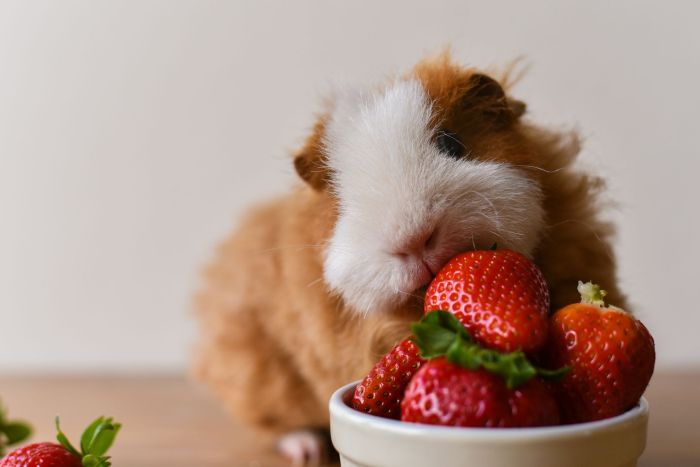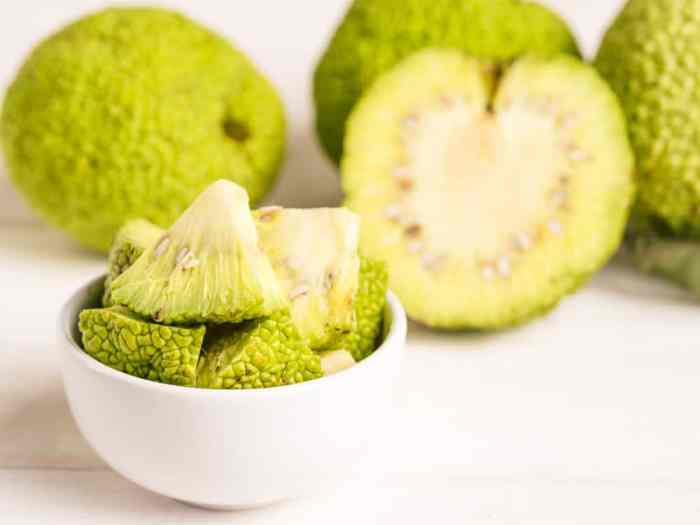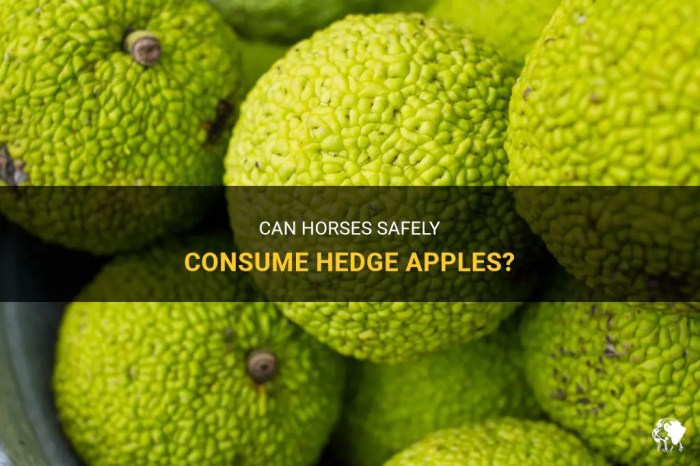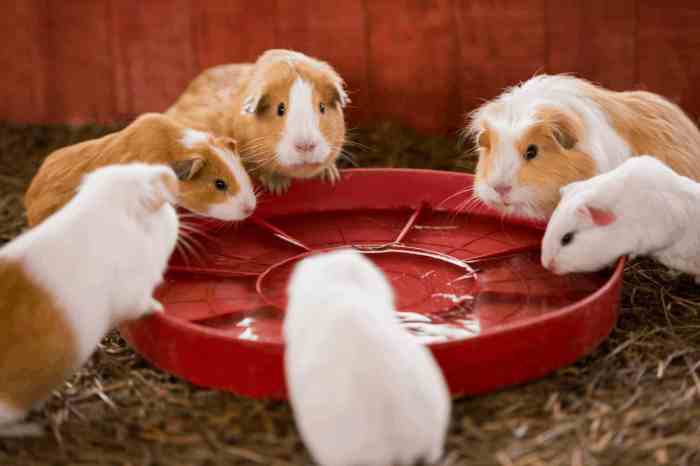As the question of can pigs eat hedge apples takes center stage, this opening passage beckons readers into a world crafted with sound knowledge, ensuring a reading experience that is both absorbing and distinctly original. The nutritional composition of hedge apples and their potential benefits for pigs will be explored in this comprehensive guide.
Hedge apples, also known as Osage oranges, possess a unique nutritional profile that sets them apart from other fruits and vegetables. Their rich vitamin, mineral, and antioxidant content makes them a potential dietary supplement for pigs, offering a range of health benefits.
Nutritional Value of Hedge Apples: Can Pigs Eat Hedge Apples

Hedge apples, also known as osage oranges, possess a unique nutritional profile that sets them apart from other fruits and vegetables. They are an excellent source of several essential vitamins, minerals, and antioxidants, making them a valuable addition to a healthy diet.
Hedge apples are particularly rich in vitamin C, an antioxidant that plays a crucial role in immune function, skin health, and collagen production. They also contain significant amounts of vitamin A, which is essential for vision, skin health, and immune function.
Additionally, hedge apples are a good source of dietary fiber, which is important for digestive health and satiety.
Mineral Content
Hedge apples are also a good source of several minerals, including potassium, calcium, and magnesium. Potassium is essential for maintaining fluid balance and blood pressure, while calcium is crucial for bone health and muscle function. Magnesium is involved in various bodily functions, including energy production, muscle function, and nerve transmission.
Antioxidant Properties
Hedge apples are rich in antioxidants, which help protect the body against damage caused by free radicals. These antioxidants include flavonoids, carotenoids, and polyphenols, which have been linked to a reduced risk of chronic diseases such as cancer and heart disease.
Comparison to Other Fruits and Vegetables
The table below compares the nutritional value of hedge apples to that of other fruits and vegetables:
| Nutrient | Hedge Apple | Apple | Banana | Orange |
|---|---|---|---|---|
| Vitamin C (mg) | 140 | 80 | 10 | 70 |
| Vitamin A (IU) | 250 | 280 | 100 | 200 |
| Dietary Fiber (g) | 10 | 5 | 3 | 8 |
| Potassium (mg) | 250 | 260 | 420 | 180 |
| Calcium (mg) | 20 | 10 | 5 | 60 |
| Magnesium (mg) | 20 | 10 | 30 | 12 |
As can be seen from the table, hedge apples compare favorably to other fruits and vegetables in terms of their nutritional value. They are a particularly good source of vitamin C, dietary fiber, and potassium.
While pigs may enjoy munching on hedge apples, those seeking crossword puzzle solutions can turn to one may be 5-4 crossword for assistance. After all, when it comes to trivia and puzzles, who knows what knowledge you might need? Back to our pigs, they can indeed feast on hedge apples, though it’s worth noting that these fruits contain a bitter substance, so moderation is key.
Potential Benefits of Hedge Apples for Pigs

Feeding hedge apples to pigs may offer potential health benefits, including improved digestion, increased weight gain, and enhanced disease resistance. While scientific studies on the specific effects of hedge apples on pigs are limited, anecdotal evidence suggests these benefits may be attributed to the fruit’s unique nutritional composition and antioxidant properties.
Digestive Health, Can pigs eat hedge apples
Hedge apples contain a high amount of fiber, which can aid in digestion by promoting regular bowel movements and preventing constipation. The fiber content also helps regulate blood sugar levels, reducing the risk of metabolic disorders.
Weight Gain
Hedge apples are a good source of carbohydrates and fats, which can provide pigs with energy for growth and weight gain. The fruit’s high fiber content also promotes satiety, helping pigs feel fuller for longer periods and potentially reducing overeating.
Disease Resistance
Hedge apples are rich in antioxidants, such as vitamin C and flavonoids. These antioxidants can help protect pigs from oxidative stress and boost their immune system, potentially reducing their susceptibility to infections and diseases.
Alternative Sources of Nutrition for Pigs

A balanced diet is crucial for the health and productivity of pigs. While hedge apples can provide some nutrients, they should not be the sole source of nutrition. To ensure a well-rounded diet, consider incorporating the following alternative food sources:
Fruits and Vegetables
Fruits and vegetables are excellent sources of vitamins, minerals, and antioxidants. Some suitable options for pigs include:
- Apples: Rich in vitamin C, fiber, and antioxidants.
- Bananas: High in potassium, magnesium, and fiber.
- Carrots: Rich in vitamin A, beta-carotene, and antioxidants.
- Sweet potatoes: Excellent source of beta-carotene, vitamin C, and fiber.
Grains and Legumes
Grains and legumes provide carbohydrates, protein, and fiber. Some common choices for pigs include:
- Corn: High in energy and protein.
- Soybeans: Excellent source of protein and essential amino acids.
- Wheat: Provides carbohydrates, protein, and fiber.
- Oats: Rich in fiber, protein, and antioxidants.
Dairy Products
Dairy products are rich in calcium, protein, and vitamins. However, it’s important to introduce dairy gradually to avoid digestive issues.
- Milk: Provides calcium, protein, and vitamins.
- Yogurt: Rich in calcium, protein, and probiotics.
Supplements
In addition to a balanced diet, supplements can help meet specific nutritional requirements. Some common supplements for pigs include:
- Vitamin and mineral premixes: Ensure adequate intake of essential vitamins and minerals.
- Antioxidants: Protect cells from damage caused by free radicals.
- Probiotics: Support digestive health and immune function.
Query Resolution
Can hedge apples be toxic to pigs?
Hedge apples contain a compound called osage orange toxin, which can be toxic to pigs in large quantities. Proper preparation and dosage are essential to minimize risks.
What are the benefits of feeding hedge apples to pigs?
Hedge apples are a rich source of vitamins, minerals, and antioxidants, which can support overall health, improve digestion, and potentially boost weight gain and disease resistance.
How should hedge apples be prepared for pigs?
Hedge apples should be peeled and cut into small pieces to reduce the risk of choking. They can be fed fresh or dried and ground into a powder.
How often can pigs be fed hedge apples?
The recommended frequency of feeding hedge apples to pigs varies depending on the size and age of the animals. Consult with a veterinarian for specific guidelines.


